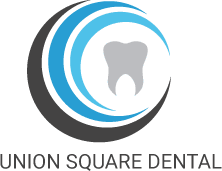
If you lose one or several permanent teeth and want a long-term solution to restore your smile, consider dental implants. Dental implants are durable, long-lasting, and mimic the strength and chewing ability of your natural teeth. The expert dentists at Union Square Dental in the Flatiron District of New York City, regularly use dental implants to preserve their patients’ smiles. To see if you’re a candidate for dental implants, request an appointment by calling the office or using the online booking tool today.
Book OnlineWhat are dental implants?
Dental implants are a type of oral prosthetic that act as replacement tooth roots. During dental implant surgery, your Union Square Dental provider places a series of small metal posts into the sockets of your missing teeth. Following surgery, your bone grows around the implants, fusing them to your jaw.
What are the advantages of dental implants?
Dental implants provide several benefits, including:
- Improved facial appearance
- Improved speech
- Improved comfort
- Easier eating
- Durability
Dental implants also improve your oral health. Unlike traditional oral prosthetics, implants don’t rely on your other teeth for support. As a result, there’s no need to alter your surrounding teeth. Individual implants also make it easier to access the spaces between your teeth, lowering your risk of tooth decay and gum disease.
Am I a good candidate for dental implants?
Anyone who has healthy teeth and gums, as well as plenty of jawbone density, is a good candidate for dental implants. If you have insufficient jawbone or you have gum disease, your dentist might recommend a sinus lift or a bone graft prior to receiving implants.
You also need to be healthy enough to undergo a routine dental procedure like an extraction or deep cleaning. This is because placing dental implants requires surgery. If you have a chronic condition like high blood pressure or diabetes, make sure to let your Union Square Dental provider know. These conditions won’t necessarily disqualify you from receiving dental implants, but they can increase your risk of complications.
What is it like to get dental implants?
Receiving dental implants usually takes a period of between 6-12 months and a series of several dentist appointments. While this may seem like a major commitment, it’s important to remember that with proper care, your implants can last a lifetime.
During your first appointment, your dentist performs an oral exam and takes a series of digital X-rays to get a closer look at your jawbone and tooth roots. If everything looks good, your dentist administers a local anesthetic and surgically places one implant for each missing tooth. After surgery, your dentist sends you home with a list of recovery instructions. Your mouth heals for a period of between three to four months.
After your mouth heals, your return to Union Square Dental and your dentist takes impressions of your teeth. Your dentist also attaches a post to each implant, known as an abutment. Next, your impressions are sent to a laboratory that manufactures your crowns, bridges, or implant-supported dentures.
You return for your final appointment a few weeks later, and your dentist attaches your crowns, bridges, or dentures to your implants. You leave the office with a brilliant smile that mimics the look and feel of your natural teeth.
What if I chip or crack an implant?
The team at Union Square Dental also performs implant restorations. If you’re in an accident and chip, crack, or otherwise damage an implant, let the team know. They’ll see as soon as possible and make corrections as necessary.
To learn more about the benefits of dental implants, request an appointment at Union Square Dental today by calling the office or using the online booking tool.
